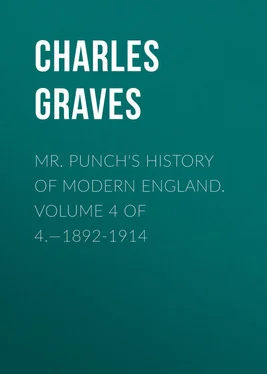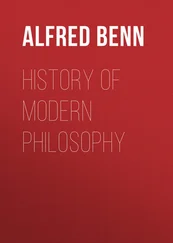Charles Graves - Mr. Punch's History of Modern England. Volume 4 of 4.—1892-1914
Здесь есть возможность читать онлайн «Charles Graves - Mr. Punch's History of Modern England. Volume 4 of 4.—1892-1914» — ознакомительный отрывок электронной книги совершенно бесплатно, а после прочтения отрывка купить полную версию. В некоторых случаях можно слушать аудио, скачать через торрент в формате fb2 и присутствует краткое содержание. ISBN: , Издательство: Иностранный паблик, Жанр: foreign_prose, foreign_humor, на английском языке. Описание произведения, (предисловие) а так же отзывы посетителей доступны на портале библиотеки ЛибКат.
- Название:Mr. Punch's History of Modern England. Volume 4 of 4.—1892-1914
- Автор:
- Издательство:Иностранный паблик
- Жанр:
- Год:неизвестен
- ISBN:http://www.gutenberg.org/ebooks/48405
- Рейтинг книги:5 / 5. Голосов: 1
-
Избранное:Добавить в избранное
- Отзывы:
-
Ваша оценка:
- 100
- 1
- 2
- 3
- 4
- 5
Mr. Punch's History of Modern England. Volume 4 of 4.—1892-1914: краткое содержание, описание и аннотация
Предлагаем к чтению аннотацию, описание, краткое содержание или предисловие (зависит от того, что написал сам автор книги «Mr. Punch's History of Modern England. Volume 4 of 4.—1892-1914»). Если вы не нашли необходимую информацию о книге — напишите в комментариях, мы постараемся отыскать её.
Mr. Punch's History of Modern England. Volume 4 of 4.—1892-1914 — читать онлайн ознакомительный отрывок
Ниже представлен текст книги, разбитый по страницам. Система сохранения места последней прочитанной страницы, позволяет с удобством читать онлайн бесплатно книгу «Mr. Punch's History of Modern England. Volume 4 of 4.—1892-1914», без необходимости каждый раз заново искать на чём Вы остановились. Поставьте закладку, и сможете в любой момент перейти на страницу, на которой закончили чтение.
Интервал:
Закладка:
Butchered – to make an Easter Holiday,
For Orangemen who yearn to have their say!
They've got political delirium tremens .
Orange ? Nay, they're sour as unripe lemons!
In the "Essence of Parliament" little is said of the arguments, but we get a glimpse of Lord Randolph Churchill's return to the political arena and echoes of the unbridled loquacity of Mr. Sexton. The cartoons are more instructive, notably that on the introduction of the "Guillotine" by Gladstone, with the G.O.M. as chief operator, Harcourt and Morley as republican soldiers, and Amendments, as heads, falling into a waste-paper basket. The fate of the measure is neatly hit off in the "Little Billee" cartoon; Home Rule as "Little Billee" is about to be massacred by the House of Lords, represented by Salisbury and Hartington as chief villains. "Little Billee" in the legend not only survived but attained high distinction in after life; but it is hard to say whether Punch implied a similar resurrection for the Bill of 1893. But whatever were his views on the merits of Home Rule, Punch was decidedly critical of the Government's naval policy, and when Mr. Gladstone and Mr. Morley had simultaneously made seemingly irreconcilable speeches on the subject, he adroitly invoked the shade of Cobden, who had, in certain conditions, proclaimed himself a Big Navyite. Punch fortified the argument by a set of verses headed "Rule Britannia" and ending with this stanza: —
Devotion to the needs of home
And claims parochial is not all.
Beware lest shades more darkling come
With gloomier writings on the wall.
Rule, Britannia! Britannia, rule the waves!
Britons to careless trust should ne'er be slaves.
Mr. Gladstone and his Successor
Yet when Mr. Gladstone resigned the premiership, early in 1894, Punch's tribute is an unqualified eulogy of the "Lancelot of our lists": —
"Unarm, Eros ; the long day's task is done."
This is no Antony ; here's a nobler one;
Yet like the Roman his great course is run.
From source to sea a fair full-flooded flow
Of stainless waters, swelling as they go,
Now widening broad in the sun's westering glow,
Broad widening to the ocean, whither all
The round world's fertilizing floods must fall,
The sweeping river with the streamlet small.
Hang up the sword! It struck its latest stroke,
A swashing one, there where the closed ranks broke
Into wild cheers that all the echoes woke.
That stroke, the last, was swift, and strong, and keen,
Now hang thou there, though sheathed, yet silver-clean,
For never felon stroke has dimmed thy sheen!
For thee, good knight and grey, whose gleaming crest
Leads us no longer, every generous breast
Breathes benediction on thy well-won rest.
The field looks bare without thee, and o'ercast
With dark and ominous shadows, and thy last
Reveille was a rousing battle-blast!
But though with us the strife may hardly cease,
We wish thee, in well-earned late-coming ease,
Long happy years of honourable peace!
The "last stroke" referred to was doubtless the speech in which Mr. Gladstone uttered his warning to the Lords, a warning translated into action by the Parliament Act of 1910. Lord Rosebery, his successor, came from the gilded chamber, and, in spite of his democratic record and brilliant gifts, was not enthusiastically welcomed by the Liberal Party. But Punch had no misgivings at the moment and acclaimed him in a cartoon in which he enters the lists, "from spur to plume a star of tournament," with Harcourt as his squire, a reading of their relations hardly borne out by the sequel. The Cabinet were not a "band of brothers," and, as we have said above, the most notable legislative feature of the Liberal administration was the "Radical Budget" of Sir William Harcourt. Punch's comment, in the cartoon "The Depressed Dukes" and the verses on "The Stately Homes of England," combined prescience with a touch of malice. The Duke of Devonshire is shown saying to the Duke of Westminster, "If this Budget passes, I don't know how I am going to keep up Chatsworth," and the Duke of Westminster replies, "If you come to that, we may consider ourselves lucky if we can keep a tomb over our heads." Mr. Chamberlain's famous phrase about "ransom" is recalled, in view of his rapprochement to the Tories, to illustrate his falling away from Radicalism, and Punch's references to him are, for a while, critical to the verge of hostility. Sambourne's picture of the interesting development of the "Josephus Cubicularius (orchidensis)" exhibits his evolution from the manufacturer of screws, the republican and the radical, to the patriot, society pet, and full-blown Conservative with a peerage looming in the future; while in the "Essence of Parliament" he is ironically complimented on investing the High Court of Westminster with "the tone and atmosphere of the auction-room."
On the other hand, Punch recognized that a disposition to add to our Imperial responsibilities was no longer a Tory monopoly. Uganda was annexed in 1894, and John Bull is seen finding a black baby on his doorstep: "What, another ! Well, I suppose I must take it in," the explanatory verses being headed " Prestige oblige ." The assassination of President Carnot prompts a tribute to France: —
Sister in sorrow now as once in arms,
Of old fair enemy in many a field —
an obvious adaptation of Sir Philip Sidney's "that sweet enemy France." But in the realm of foreign affairs the most striking event was the Chino-Japanese war. Here Punch's sympathies are clearly revealed in his cartoon, "Jap the Giant-killer," with an up-to-date fairy-tale text; in the picture of Japan as the Infant Phenomenon lecturing on the Art of War to John Bull, Jonathan, the Kaiser and other crowned heads; and in the condemnation of the jealous intervention of Russia and Germany to rob Japan, who had "played a square game," of the fruits of victory. The death of the Tsar Alexander III in November, 1894, is commemorated in a cartoon in which Peace is chief mourner. Punch , as we have seen, had not been enthusiastic over the gravitation of Russia towards a French alliance; but no official declaration of its existence was made until 1897, though it was mentioned publicly by M. Ribot in 1895.
"Old as I am my feelings have not been deadened in regard to matters of such a dreadful description." ( Mr. Gladstone's Birthday speech at Hawarden on the Armenian atrocities .)
The Seven Lord Roseberys
The Rosebery Cabinet resigned in June, 1895. Punch's admiration for Lord Rosebery had steadily waned during his brief tenure of the Premiership, and distrust of his versatility is revealed in the versified comment on Mr. St. Loe Strachey's article in the Nineteenth Century . There the "Seven Ages of Rosebery" are traced, in the manner of Jaques, from the Home Ruler onward through the phase of London County Council chairman to Premier, and Sphinx à la Dizzy, ending: —
Last scene of all
That ends this strange eventful history,
Newmarket Rosebery, Ladas -owner, Lord —
Sans grit, sans nous, sans go, sans everything.
Lord Salisbury's third Cabinet was reinforced by the inclusion of the Liberal-Unionists – the Duke of Devonshire, Mr. Goschen and Mr. Chamberlain. It was a powerful combination, but suffered in the long run from the inherent drawbacks of all coalitions, though the course of events postponed the inevitable disruption. Before the Liberals left office, Mr. Gladstone had emerged from his retirement to denounce the "Armenian Atrocities" and urge British intervention. Here, as in earlier years, Punch sided with the advanced Liberals, rejoiced in his well-known cartoon, "Who said 'Atrocities'?" that there was life in the old dog (Mr. Gladstone) yet; welcomed the adhesion of the Duke of Argyll to Mr. Gladstone's campaign in another cartoon of the "Old Crusaders: Bulgaria, 1876, Armenia, 1895"; and denounced the unchangeable ferocity of the Turk. When the Bishop of Hereford invited his clergy to send up petitions respecting the Armenian atrocities, one vicar refused to protest against Turkish crimes, on the ground that the English Government was exercising all its ingenuity to persecute and plunder Christians here. This referred to the Liberal Government's Welsh Disestablishment Bill. Punch ironically declared that the vicar's logic was as convincing as his Christian sympathy was admirable. On the return of the Unionists to power, Punch continued to urge strong measures, and lamented the powerlessness of the "Great Powers" to bring about reforms in Turkish administration.
Читать дальшеИнтервал:
Закладка:
Похожие книги на «Mr. Punch's History of Modern England. Volume 4 of 4.—1892-1914»
Представляем Вашему вниманию похожие книги на «Mr. Punch's History of Modern England. Volume 4 of 4.—1892-1914» списком для выбора. Мы отобрали схожую по названию и смыслу литературу в надежде предоставить читателям больше вариантов отыскать новые, интересные, ещё непрочитанные произведения.
Обсуждение, отзывы о книге «Mr. Punch's History of Modern England. Volume 4 of 4.—1892-1914» и просто собственные мнения читателей. Оставьте ваши комментарии, напишите, что Вы думаете о произведении, его смысле или главных героях. Укажите что конкретно понравилось, а что нет, и почему Вы так считаете.












